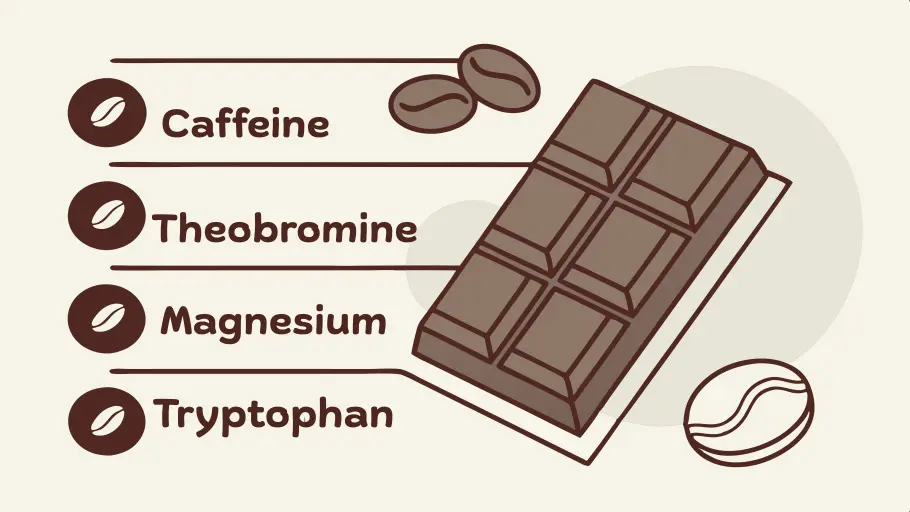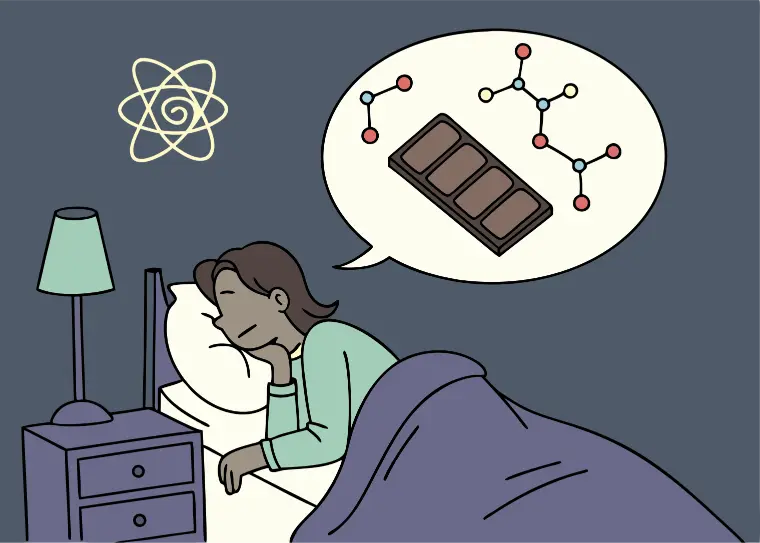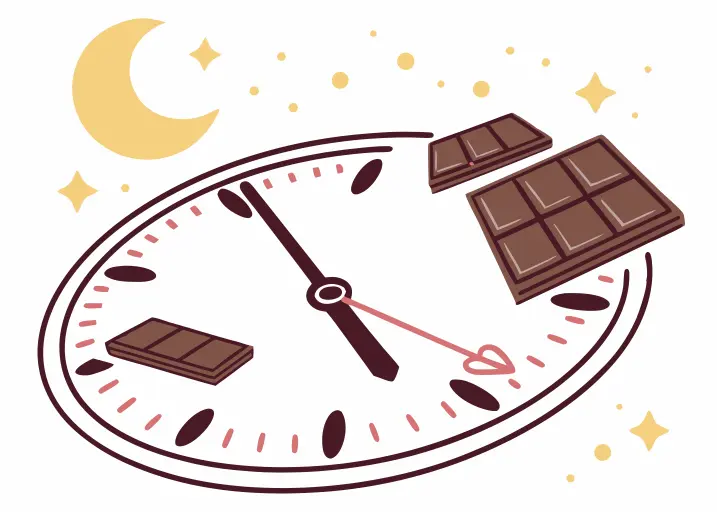Many people love to enjoy chocolate as a nighttime treat – maybe a piece of dark chocolate, a warm cup of cocoa, or a quick bite from their favorite candy bar. But if you ate chocolate before bed last night, you might be wondering: does this sweet habit help you sleep better, or is it keeping you awake?
The answer isn’t black and white. Whether chocolate helps or hurts your sleep depends on what type you eat, how much you have, when you eat it, and how your body reacts to it.
What Happens When You Eat Chocolate Before Bed?
Chocolate isn’t just sugar and cocoa – it contains over 300 different compounds that can affect your brain and body. The main ones that impact sleep are:
Caffeine – This is the same stimulant found in coffee. It can make it harder to fall asleep, reduce how long you sleep, and make your sleep less deep if you have it too close to bedtime.
Theobromine – This is similar to caffeine but milder. It affects everyone differently – some people find it relaxing, while others feel more alert after having it.
Magnesium – This mineral helps your muscles relax and lowers stress hormones, which can help you feel calmer before bed.
Tryptophan – Scientific research shows this amino acid helps your body make serotonin, which then helps make melatonin (the hormone that tells your body it’s time to sleep).
These ingredients work together to affect your nervous system and your body’s natural sleep-wake cycle.

When Chocolate Can Actually Help Your Sleep
Believe it or not, chocolate – especially dark chocolate before bed – can sometimes support better sleep when eaten the right way:
- Magnesium in chocolate helps relax your body and may improve sleep quality by reducing stress hormones and helping muscles unwind
- Tryptophan boosts the production of serotonin and melatonin, both important for falling asleep and staying asleep
- Dark chocolate contains flavanols – These antioxidants may support overall sleep quality and help manage stress
- The comfort factor – enjoying a warm cup of cocoa or small piece of chocolate can be soothing and help you wind down for the night
For those dealing with chronic pain and fatigue or managing inflammation and fatigue, the magnesium in dark chocolate might provide some relief before bedtime.
How Chocolate Can Mess With Your Sleep
On the flip side, chocolate before bed can definitely disrupt your sleep:
Caffeine content – Dark chocolate has more caffeine than milk or white chocolate, which can delay sleep and reduce sleep quality, especially if you’re sensitive to caffeine
Theobromine effects – While gentler than caffeine, it can still keep some people awake or make them feel restless
Sugar crashes – Studies on sugar and sleep show that chocolate with lots of sugar can cause your blood sugar to spike and then crash, leading to broken sleep and vivid dreams
Expert recommendations – The National Sleep Foundation and other sleep experts generally suggest avoiding caffeine-containing foods, including chocolate, in the hours before bed

Does the Type of Chocolate Matter?
Absolutely. Here’s how different chocolates compare:
Dark Chocolate
- Highest caffeine content
- Highest theobromine content
- Lower sugar levels
- May provide the question “does dark chocolate boost energy” with a yes – but this energy boost is exactly why it might keep you awake
Milk Chocolate
- Moderate caffeine content
- Moderate theobromine content
- Higher sugar levels
White Chocolate
- Almost no caffeine
- Almost no theobromine
- Highest sugar content
Different brands can also vary in how much caffeine and theobromine they contain, so check labels if you’re sensitive to these compounds.
When You Eat Matters
Caffeine can stay in your system for hours. It takes about 4-6 hours for your body to eliminate half of the caffeine you consume. To avoid sleep problems, try to stop eating chocolate at least 4-6 hours before bedtime.
If you’re someone who struggles with basic fatigue management or finds yourself tired after 8 hours sleep, paying attention to your chocolate timing becomes even more important.
Early afternoon is usually the safest time to enjoy chocolate if you’re worried about it affecting your sleep.

Everyone Reacts Differently
Not everyone responds to chocolate the same way. Several factors affect how chocolate impacts your sleep:
Caffeine sensitivity – Some people process caffeine quickly, while others feel its effects much longer. This relates to your individual metabolism and can impact your overall blood sugar and energy levels.
Age and metabolism – Older adults and people with slower metabolisms tend to be more sensitive to stimulants
Health conditions – Anxiety, insomnia, and certain genetic factors can make you more likely to be affected by chocolate’s stimulating effects
Personal sleep patterns – Keep track of how chocolate affects your own sleep to find what works for you
Should You Eat Chocolate Before Bed?
The decision comes down to weighing the pros and cons for your specific situation. If chocolate doesn’t seem to disrupt your sleep, a small amount of dark or milk chocolate earlier in the evening might be okay.
To be careful:
- Stick to small portions
- Choose options with less caffeine (milk or white chocolate, or dark chocolate with lower cocoa content)
- Keep a sleep diary to track how chocolate affects you
- Talk to your doctor if you have sleep disorders or other health conditions
If you’re working on beat afternoon fatigue strategies or looking for quick energy fixes, remember that the energy boost from chocolate might interfere with your nighttime sleep.
Good Snacks to Eat Before Bed
If you want something to eat before bed that actually supports sleep, try these instead:
- Bananas – rich in magnesium and tryptophan
- Almonds – contain magnesium and healthy fats
- Kiwi – research shows it may improve sleep quality
- Herbal teas – chamomile, valerian, or lavender
- Non-caffeinated cocoa blends or sleep-friendly hot chocolate mixes
These options can satisfy your nighttime cravings without the stimulating effects of regular chocolate. For more ideas, check out foods that naturally increase energy during the day rather than at night.

Here’s the main idea:
Eating chocolate before bed isn’t automatically bad for you – but the details matter a lot. The type of chocolate, how much you eat, when you eat it, and how your body handles it all play important roles.
Try experimenting with different timing and portion sizes, and pay attention to how your body responds. If you’re dealing with ongoing sleep issues, it might be worth exploring whether green noise sleep techniques or understanding the best nap length could help improve your overall rest.
With some awareness and moderation, you can probably still enjoy chocolate as part of a healthy routine without sacrificing your sleep quality.








